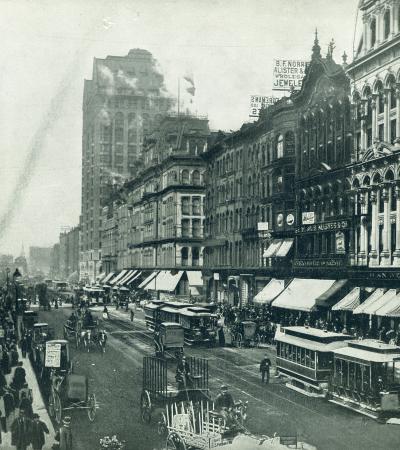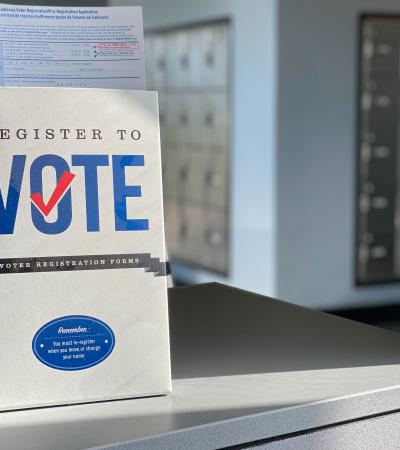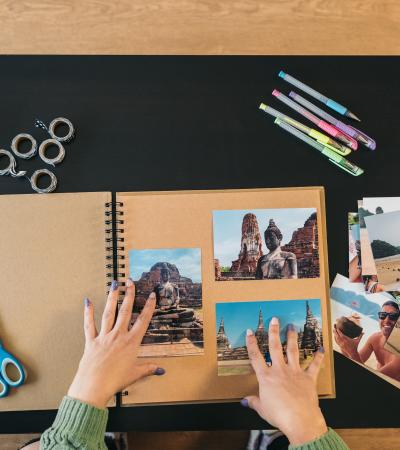The handbook contains program ideas and planning checklists to help programming librarians design community and audience specific programs no matter library size, location, or budget. The handbook can be used in tandem with AASLH’s Making History at 250 field guide, which provides five interpretive themes and accompanying questions to offer a shared vision and vocabulary for 250th planners across the country.
Lightly adapted from the 250th Anniversary Handbook, this article highlights 12 programs, split into seven themes, that may be of particular interest to libraries. To see more program ideas and other planning details, view the full handbook.
K-12 Youth Programs
Introduce younger generations to the idea that history is more than dates and facts — it’s about people’s lives and why what happened yesterday matters today.
1. Essay/speaking contest
Sponsor an essay writing or public speaking competition for local students. Use one of the Making History at 250 themes to create a prompt and encourage contestants to use local history to explore it. Reach out to your school district office to find teachers who might be interested in collaboration. Motivate participation by offering all participants a prize or small scholarship for the winner. Participants could also submit their essays or projects to the America’s Field Trip competition, an initiative of America 250, the entity leading Semiquincentennial planning at the federal level.
2. History/civics day showcases
Host the local or state edition of a National History Day or Civics Day showcase to display students’ research projects. These showcases provide students with a venue to share and talk about their research on historical or civics topics. Your local school district office, state department of education, or the nonprofit National History Day will have information on how to get involved with these types of events.
Communities Doing History
Inviting people from across your community to “do” history at your library and share their stories provides them with a venue to learn from each other, with hopes of fostering a sense of belonging and encouraging an interest in local history.
3. Memories Road Show
Plan and host a Memories Road Show program by inviting community members to bring objects, documents, photographs, and other historical material they find meaningful. Create opportunities for them to discuss the items with library staff and volunteers to share with fellow community members. You could even document the items for inclusion in an online community history database using scanners or photography equipment. Host these events in various community partner organizations to allow for wider participation.
4. National Register of Historic Places training
Offer workshops or webinars on how to submit a house, property, or commercial/civic building for listing on the National Register of Historic Places. Connect with the staff of your State Historic Preservation Office, Tribal Historic Preservation Office, or local historic commission for resources and guidance on leading these types of programs. They may also have information on tax incentives and funding opportunities to help community members to help steward the built environment.
Tours
Providing your audience with in-depth, place-based experiences offers them new ways to explore your collections, content, and community.
5. Community-led tours
Collaborate with community historians or culture-bearers — people deeply rooted in the heritage, traditions, and lifeways of your community — to lead walking tours of nearby neighborhoods, heritage areas, or cemeteries. Reach out to local neighborhood associations or cultural groups to connect with the community members most familiar with their stories. Community-led tours are a wonderful way to amplify the expertise of local residents and bring in different perspectives while highlighting the stories of interesting places and people in your community.
Exhibitions
Showing off your library’s own collection or partnering with an organization to help them display their collection in creative, small-scale 250th-themed exhibitions provides visitors with an opportunity to reexamine objects, documents, and stories in a new context.
6. Label trail
Create a special “label trail,” a series of temporary labels in an existing exhibition that uses the 250th themes to provide new context for stories and artifacts. Invite a guest curator — artist, historian, community member, or students — to write the labels.
7. Community-curated exhibit
Work with a community group, by providing resources and guidance, to assemble objects into an exhibit that represent their experiences and perspectives. Work with a local museum to help prepare community groups to design their own exhibits by co-hosting workshops on exhibition development, including research and interpretation. This can also be a great starting point to help identify gaps in your collections and seek out items for communities whose history is not adequately represented in your collections.
Social and Digital Media
Sharing your community’s stories and collections through social and other digital media outlets helps you get your stories out to the world by reaching a wider audience.
8. Today in history
Take your visitors on a journey through their community’s history at different points of the Revolutionary era — or other eras that connect thematically — with a daily “Today in History” post. You might even consider partnering with a local high school history class and having them write a series of posts based on local history topics. This type of project gives students real-world writing experience and the joy of seeing their work published.
9. Podcasts and videos
Produce a podcast or video series based on local history stories. You could explore a single theme across many eras, deeply investigate a single time period or person, or other thematic approaches to organizing episodes. Work with a local student or youth groups to research, write, and record episodes.
Civic Engagement
Encourage your community to explore how learning about our history, government, and democratic institutions can inspire greater participation in the community’s civic life.
10. Citizenship Ceremonies
Host citizenship ceremonies to help create a bond between new citizens and your community. Contact your local federal courthouse for details on how to serve as a host site.
History-Themed Gatherings
11. Trivia night
Find out where your target audience spends time together, or identify a place that already hosts a trivia night, and bring the event to them by hosting a history trivia night at a local bar or similar venue. This is a win-win-win program: it brings people to a local business, raises the profile of your library, and shows participants that learning history can be interactive and fun.
12. Community scavenger hunts
Create a tour or scavenger hunt in which community members photograph themselves in front of historic places in your area and post them on social media with shared hashtags. Your audience will discover unfamiliar places in their community, and your library’s name will end up in many people’s feeds.



